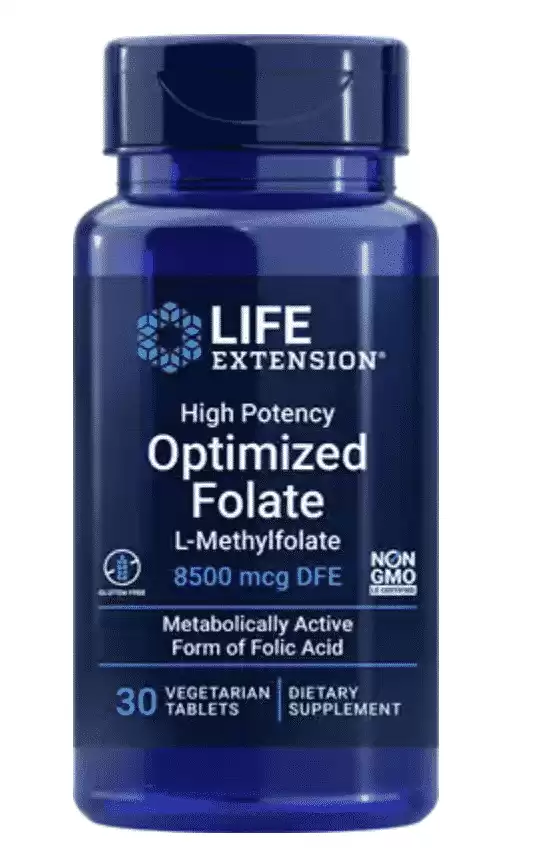Do You Need Methylfolate for Depression? Everything you NEED to Know!
Depression, just like anxiety is caused by too many toxins in our bodies or a nutrient deficiency, just like any disease. Have you ever heard of using methylfolate for depression? If not, now you have and I will cover all of the benefits and the best products to try!

Table of Contents
Why is Methyl folate for depression?
What is Methyl folate? It is actually a folic acid form which is also known as levomefolic acid. Methyl folate is the active form of folic acid/ folate. Folate is responsible for creating our happy/ pleasure neurotransmitters serotonin, epinephrine, and dopamine.
Methyl folate deficiency is a major cause of low serum folate and low RBC (red blood cell) levels in the blood. These are in turn major drivers of depressive symptoms. To date, methylfolate has been studied to show positive effects in reducing depression with negligible or no side effects.
Research studies in the real world show individuals with depression consuming L-methylfolate have revealed a significant decrease in depressive symptoms. Among those, administration of methylfolate to 67.9% showed patients responding to it, with even 45.7% of them experiencing remission of depression within 12 months.
12 months may sound like a long time but this is only with a single nutrient and if you have suffered for many years then this could be a huge relief for you.
Folate is responsible for creating our happy/ pleasure neurotransmitters serotonin, epinephrine, and dopamine.
(Miller A. L., 2008)

This is the best Methyl Folate (MTHF) Life Extension High Potency Folate is easier for your body to break down, the tablets are small and the dosage is high! It’s also a very affordable supplement and it has so many benefits that everyone could use taking it!
- Folic acid is the most common form of folate supplements. But research shows that many people lack sufficient activity of the enzyme that's necessary to convert folic acid to 5-MTHF.1-3
- Super high-potency dose of bioavailable 5-MTHF folate
- Supports both cardiovascular & cognitive health
- Helps maintain already-healthy homocysteine levels
- 5-MTHF folate overcomes the enzyme inefficiency roadblock
What does methylfolate do for the body?
Methylfolate is needed for the smooth occurrence of the methylation cycle. It is also for the brain to synthesize healthy amounts of the hormones serotonin, dopamine, and norepinephrine. It also boosts the formation of healthy cells, especially red blood cells in the body.
Folic acid supplements may come in different forms but most of them are used to treat low folate levels and certain types of anemia.
In addition, methyl folate creates methionine an amino acid and a metabolite of this is known as SAMe. SAMe has been studied to fight depression by (Miller A. L., 2008)
Is there a difference between folate, methylfolate and L-methylfolate?
Folic acid, popularly known as folate, is most widely used for its capabilities of preventing birth defects. However, this particular vitamin B is constantly under research to check its efficiency in combating depression. The latest study reveals that blood levels of folic acid were found to be much less in people with depression compared to others.
Methylfolate is called by different terms – Methylfolate, 5-MHTF, and MTHF. Methylfolate actually exists in two distinct isomers, the “L” or “6S” isomer is the active form, and it is also known as Levomefolate, L’5-MTHF, L-methylfolate and L-5-methyltetrahydrofolate and (6S)-5-methyltetrahydrofolate, and (6S)-5-MTHF.
What B vitamins are good for depression?
Vitamin B-12 and other B vitamins play a significant role in synthesizing brain chemicals that affect mood and other major brain functions. Research shows that low levels of B-12, vitamin B-6, and folate are linked to depression.
B-12 has been reported to delay the effects of depression and in combination with Vitamin B-6 and Folate (methylfolate). (Sangle et al., 2020)
What is the best methylfolate to take?
Methyltetrahydrafolate is the best form of methylfolate to consume. That’s the long spelling of it but most people refer to it as MTHF.
There are a few great brands that make this product but the one I recommend is the one by Life Extension. It is 1,000 mg or 1 gram and 180 capsules, giving you a a high amount lasting you a few months of methyl folate for depression. If you have absorption issues Superior Source is sublingual (taken under the tongue). It can be absorbed faster when put under your tongue.
Who should not take methylfolate for depression?
- You should not take methylfolate if you have any one or more of these conditions:
- Allergic reaction to folic acid or L-methylfolate
- Previous intolerance to such medications
- Consult a doctor and inform about any previous medical history of seizure, epilepsy, vitamin B12 deficiency or pernicious anemia.
Does methylfolate give you energy?
L-methylfolate does not give a boost of energy directly but it is a driving agent in it indirectly. It is responsible for synthesis of the feel good hormones by our brain – serotonin, dopamine, and norepinephrine that actually helps in alleviating depression.
The methylation cycle is necessary to produce ATP in the body, keep the energy levels high, and fight depression. Methylfolate is only responsible for a smooth functioning of the methylation cycle.
To summarise, taking L-Methylfolate as a supplement does help combat depression and related symptoms. The MTHFR gene and L-methylfolate together also plays many important roles in our body. Some of these include repairing DNA, boosting the immune system, elimination of toxins from the body, energy production, and more – that ultimately leads to a boost of energy.
How much Methylfolate for depression is too much?
Methylfolate is a form of vitamin B which cannot be stored in the body for future use. Thus even if you take more than what your body will actually need, it is not going to benefit you in any way.
Essentially your body pees out whatever you don’t use! This makes it very hard to overdose, because you have to take into account gut issues or previous medication use that may limit the absorption of folate or methylfolate.
The normal amount prescribed or safe for consumption by a person not pregnant is about 400 mcg. Pregnant women can be advised to consume 400 to 800 mcg a day in order to help prevent neural tubal defects.
Finally, consuming more L-methylfolate than the required amount is not likely to cause life-threatening events. Do further research on your personal needs to avoid overconsumption for prolonged periods may cause minor intoxication.
Does methylfolate help with anxiety?
Research studies show prominent effects of methylfolate helping to combat anxiety. L-methylfolate is used by the brain to synthesize sufficient amounts of serotonin, dopamine, norepinephrine, that in turn helps in boosting the mood.
Vitamin B5 promotes normal functioning of the adrenal glands, which is actively responsible in reducing stress and maintaining anxiety levels within normal.
Next, Vitamin B9 and vitamin B12 are very essential in maintaining a balance between depressive symptoms. Vitamin B6 along with magnesium also helps combat anxiety. To learn more about nutrients for anxiety, check out my blog on the nutrient deficiencies that could be causing your anxiety.
Does vitamin D3 help depression?
An 8 week study revealed that weekly administration of Vitamin D3 of 50,000 IU enhanced depression scores in patients suffering from MDD (Major depressive disorder). If you are under 80 ng/ml blood serum levels, you may want to supplement with 10,000 I.U.s per day. Furthermore, retest your vitamin d levels after supplementing for a while to know where your levels are at. Here are the vitamin Ds that I love: Nivagen 50,000 I.Us , Bluebonnet Liquid 5,000 I.us
I recommend two Vitamin Ds the Nivagen is 50,000 I.Us is a once per week capsule. If you are sick you can take 1 per day for the first 3 days of sickness.
In contrast, the Bluebonnet Liquid 5,000 I.Us is good for the whole family. If you don’t want to buy a separate one for your kids and yourself. Also, with 5,000 I.Us per drop it is long lasting and liquid is absorbed faster. Just make sure you put it under your tongue for faster and better absorption.
Some symptoms/ results of Vitamin D deficiency include Asthma, Auto Immune Diseases, Diabetes, Moodiness, frequently sick. I have an article to help you with that, it’s all about Vitamin D foods and the benefits of Vitamin D consumption.
References:
Miller A. L. (2008). The methylation, neurotransmitter, and antioxidant connections between folate and depression. Alternative medicine review : a journal of clinical therapeutic, 13(3), 216–226.
Sangle, P., Sandhu, O., Aftab, Z., Anthony, A. T., & Khan, S. (2020). Vitamin B12 Supplementation: Preventing Onset and Improving Prognosis of Depression. Cureus. https://doi.org/10.7759/cureus.11169
Originally posted 2021-03-26 18:46:02.
Megan Santiago
Latest posts by Megan Santiago (see all)
- How to Find a Trauma Therapist in Tampa - September 30, 2024
- Most Effective Ways To Overcome Fears About Your Airbnb - March 10, 2024
- 5 Remedies to Get Rid of the Cold or Flu Naturally - March 10, 2024

